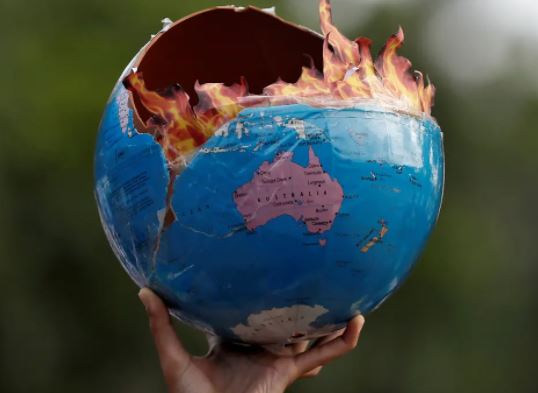Climate of Denial


This topic of “Climate of Denial” is important from the perspective of the UPSC IAS Examination, which falls under General Studies Portion.
Context
Intergovernmental Panel on Climate Change (IPCC) released its sixth assessment report on Monday.
What the editorial is about?
The way in which IPCC’s sixth assessment report, highlights that fighting climate change requires fiscal expenditure and policy changes (fueled by political will).
Intergovernmental Panel on Climate Change (IPCC)
- It is an intergovernmental body of the United Nations responsible for advancing knowledge on human-induced climate change.
- A body of almost 270 experts from 67 countries, brought together by the United Nations, gave a bleak assessment of the future of our planet and species.
Sixth Assessment Report of IPCC
- In its sixth assessment report, titled ‘Impacts, Adaptation and Vulnerability’, the IPCC discusses the increasing extreme heat, rising oceans, melting glaciers, falling agricultural productivity, resultant food shortages and increase in diseases like dengue and zika.
Failed climate leadership
- Antonio Guterres, the United Nations Secretary-General, quoted in The New York Times, describes the IPCC report as being “an atlas of human suffering and a damning indictment of failed climate leadership.”
Irreversible impact on “ecosystems with low resilience”
- The IPCC warns that should our planet get warmer than 1.5 degrees Celsius from pre-industrial times (we are at 1.1 degrees at present), then there will be an irreversible impact on “ecosystems with low resilience” such as polar, mountain and coastal ecosystems “impacted by glacier melt, and higher sea-level rise”.
- This will cause devastation to “infrastructure in low-lying coastal settlements, associated livelihoods and even erosion of cultural and spiritual values.”
Diseases
- The increased heat will lead to an increase in diseases like diabetes, circulatory and respiratory conditions, as well as mental health challenges.
Implications for India
Climate “maladaptation”
- The IPCC highlights that climate “maladaptation” will especially affect “marginalized and vulnerable groups adversely, indigenous people, ethnic minorities, low-income households and informal settlements” and those in rural areas.
- Therefore, India, with a majority of its people falling in these categories, will be especially devastated.
India as a vulnerable hotspot
- The IPCC highlights India as a vulnerable hotspot, with several regions and cities facing climate change phenomena like flooding, sea-level rise and heatwaves.
- For instance, Mumbai is at high risk of sea-level rise and flooding, and Ahmedabad faces the danger of heatwaves — these phenomena are already underway in both cities.
Vector-borne and water-borne diseases
- Vector-borne and water-borne diseases such as malaria and dengue will be on the rise in sub-tropical regions, like parts of Punjab, Assam and Rajasthan.
Diminished nutritional quality
- When the concentration of carbon dioxide in the atmosphere increases, the grains we consume, including wheat and rice, will have diminished nutritional quality.
- Over the past 30 years, major crop yields have decreased by 4-10 per cent globally due to climate change.
- Consequently, India, which continues to be predominantly agrarian, is likely to be especially hurt.
Impact on Urban India
- Urban India is at greater risk than other areas with a projected population of 877 million by 2050 nearly double of 480 million in 2020.
- The concentration of population in these cities will make them extremely vulnerable to climate change.
What makes the issue more complex?
- We know that we are experiencing the adverse consequences of the impacts of climate change daily. Yet, our political class has no cohesive and urgent policy roadmap to combat rising emissions and our diminishing life spans.
- This makes the issue more complex.
Conclusion
- India is already experiencing the effects highlighted in the recent IPCC report.
- Addressing it requires fiscal expenditure and policy changes fueled by political will.
Referred Sources

